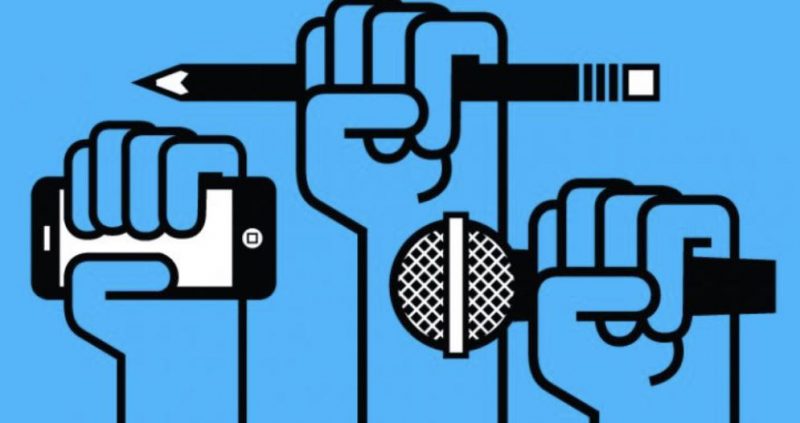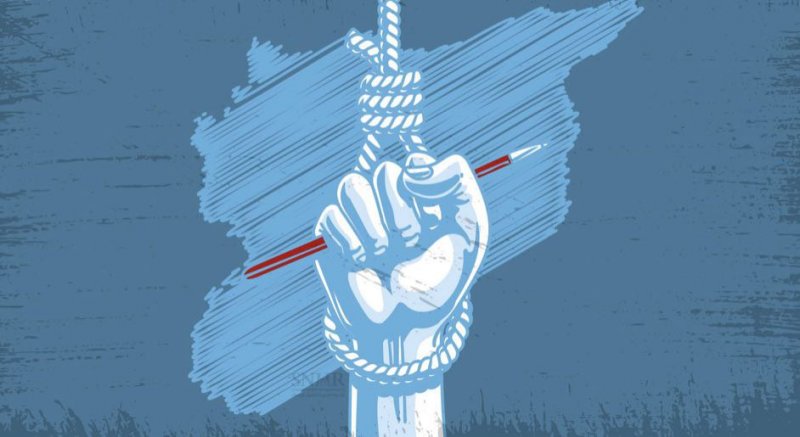This is a professional announcement
This is a professional announcement. According to Iran Gate, every day we witness a few domestic media journalists being arrested by the political police, and this process seems to be an endless path. A truly hardworking class with fewer job benefits, facing numerous threats from job insecurity to psychological insecurity under the constant threat of arrest, imprisonment, and political courts.
Imagine Mehdi Beik, the editor-in-chief of the Etemad newspaper, being arrested solely for following up on the situation of two detainees from the recent protests who were unfortunately executed. God knows what he’s going through behind the high walls of Evin, in the interrogation room and solitary confinement. Like his other colleagues in detention, he was only performing his duty of informing and enlightening. However, it seems this duty conflicts with the duties of those who oppose enlightenment and awareness.
Journalists’ Trade Association
The Journalists’ Trade Association of Iran is a nationwide syndicate for journalists in Iran, established in Mehr 1376 (October 1997) following the rise of the reformist government.
However, its lifespan, like its support for its members, is not very significant, as on Tir 4, 1387 (June 24, 2008), this association was declared dissolved by the Administrative Justice Court due to the weak governmental foundation of its establishment.
The administrative office of the Journalists’ Trade Association of Iran, which had been sealed by the Tehran prosecutor’s office on Mordad 14, 1388 (August 5, 2009) by order of Judge Mortazavi, was unsealed on Azar 8, 1389 (November 29, 2010) to allow the housing cooperative of the association to continue its administrative activities. However, according to the board of directors’ statement, the activities of the Journalists’ Trade Association of Iran, especially its secretariat affairs such as renewing internal and international membership cards, unemployment insurance matters, and the activities of membership and welfare committees, are still not possible until further notice.
Reopening of the Association
On Esfand 11, 1392 (March 2, 2014), Ali Jannati announced the resolution of the issue regarding the continuation of the Journalists’ Trade Association of Iran’s activities. This association, which had been closed by the previous government due to a complaint from the Ministry of Intelligence and by order of Tehran prosecutor Saeed Mortazavi, no longer has a legal barrier to operate following the withdrawal of this complaint. It has been decided that journalists will hold a general assembly and elect new board members. The then prosecutor, Mohseni Ejei, also stated that if the association does not want to engage in political activities, it can resume its operations.
But what is meant by political activity? Indeed, such interpretations, which can allow for any kind of interpretation and accusation based on a security reading, are more of a precondition for the association’s inactivity and failure to perform its duty, which is fundamentally to support its members and even journalists who are not members, to justify its operation.
It is clear that in the security-dominated atmosphere of society, one cannot expect miracles from this association, but at the very least, they can be the voice of their colleagues.
This model of professional deprivation and victimization of journalists may make them the easiest target for the political police to be the first group on the arrest list to create fear and achieve artificial security calm.
Woe to irresponsible managing editors
There were not a few managing editors whose journalist colleagues faced arrest and heavy security charges during this time, but apart from one or two weak reactions and disclaimers, we saw no follow-up from them. For example, a managing editor who sat in a live television program opposite a representative of one of the most extreme political currents for a debate and repeatedly criticized this person’s past labeling and their affiliated current.
However, when the cleric he was debating accused two journalists and his colleagues, who were arrested for preparing a report in his newspaper, of espionage, there was not even a brief protest or defense of his colleagues. So, it’s natural that when there is minimal professional support, the cost of arrest and heavy charges for the security and judicial apparatus becomes very low.
The future of journalism in the country
Press and modern government are considered imported phenomena, with the modern state’s age in Iran not even reaching 100 years. Perhaps this is why these two phenomena have not yet properly integrated with our historical and social fabric. The rise and fall of governments and the nation’s relationship with them can be understood from this perspective. Meanwhile, the relationship between the press and the media with governments has also been convoluted. Sometimes they have moved in alignment and harmony, sometimes they have had conflicts, and sometimes one has advanced while the other has lagged.

In a way, reviewing the history of the press in our country shows that whenever we have witnessed the solidification of power and the concentration of central government authority, the press has declined, and whenever the central government has weakened and civil society has strengthened, the role of the press has become more prominent. What can we learn from this history and these ups and downs for our present? In other words, what lesson does this past have for our today and tomorrow?
It seems that from this experience, we are witnessing the decline of the role and impact of privately-owned media. In other words, today, most effective media outlets that have a wider reach than others are somehow dependent on parts or components of the government. If this continues, it could have negative consequences in the area of national security, as the reduced reach of domestic media due to dependencies on government institutions could provide a pretext for the takeover of the media landscape by outlets that are directed and managed from outside. However, this is not the only issue we face in the media sector today.
The widespread popularity and acceptance of social networks by Iranians have led to a situation where today, instead of newspapers, they hold mobile phones in their hands. Additionally, the inclination and dependency of Iranians on oral culture cannot be ignored in the reduction and decline of domestic media audiences. However, alongside these, the weak performance and knowledge, as well as the creation of unrealistic red lines by the media themselves, cannot be overlooked in reducing audience engagement. These combined conditions have created a complex situation for the media, which, as mentioned, can have negative consequences in the area of national security.
It seems that the constant security threats, heavy costs, and lack of a suitable job outlook for journalists will pose serious risks not only for this profession but also for the future of the country and society. It seems unlikely that the government and the ruling system will give it much importance, like other important but neglected components such as the environment.

